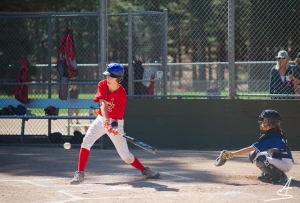My son Ace plays baseball. When he was eight I told him I didn’t care if he climbed and did mountain sports like me or not, but he had to find something outdoors he liked and get after it. “You’re not going to sit around in front of screens all the time,” I said. He chose baseball. Now he’s fairly obsessed with every corner of the national pastime, and I’ve been helping coach his teams.
I can still remember some of the homers and line drives I hit when I was his age, and I can still feel some of the hot-corner catches I gloved. Now I’m one of many adults bringing 12-year olds into the sport.
A lot of times the kids goof off. They show up to practice talking kid gossip and throwing the ball randomly toward one another, basically practicing poor throws and potentially hitting each other. Then during structured practice some of them sometimes compete for attention by clowning. Maybe they dance around and taunt on a base, maybe they call for the ball at any throw regardless of the play, or maybe they get tagged out but keep running like a jester all the way to home anyway. This kid-crap on the field pisses me off, but I try to discipline them back into learning the game without showing anger. I don’t always succeed, but I know they’re just kids. They have plenty of disciplined hours in school, they’ve got various stresses in their lives they’re often not ready for, and it’s important for kids to play.
But by age 12 baseball is not child’s play any more. The bigger kids (like Ace) are hurling that little white ball across the infield like a bullet, and they bat with shocking force. You gotta be ready or else. And they want to be cool like major leaguers, they want to win. It’s us mentors’ job to teach them how to win and play as hard as they can with sportsmanlike respect for the game and their opponents. I tell the kids with all my sincerity that it doesn’t matter if they win or lose, the real tragedy would be to go through life without finding what you can play your heart out to, and get it done. The real triumph is the honor to play.
Last month Ace hit a three-run homer to take the lead against our toughest rivals. Everyone on our side roared, myself coaching first base too, of course. As he rounded first I high-fived him as we watched the ball sail over the fence and bounce into a parking lot. Around second he trotted basking in triumph, and around third he headed toward home where his teammates were gathered and bouncing like popcorn to welcome him. The other team kicked at the dirt, waiting glumly in their positions. That was a great moment he and I will remember forever.
Yet it’s not all innocent glory watching our kids turn into jocks. The whole process starts, of course, when friends and peers are divvied up pretty arbitrarily into opposing sides. We put them in uniforms and line them up on their respective baselines and sanctify it all with pledges of allegiance to the flag and to fair play, and if there’s musicians “…the home of the brave!” echoes across the outfield. When the game gets going the parents and friends and coaches and everyone important to them watch and shout as the kids hurl their pitches and the other side protects home and hits with high-performance composite bats, and everyone keeps score while we all cheer when they do well and remind them when they screw up. We teach baseball, but the real message they hear is that play is no longer free-form, you don’t get to goof around as you like. There’s rules and especially there’s consequences. If you want to win you have a lot to learn. That’s all well and good, let’s bring them into real life, but it gives me pause when I hear how our little darlings in the dugout have learned to say things like, “I really want to beat the crap out of these guys!” or “C’mon ___ don’t suck!”
Ace now has a new, adult-sized bat (at age 12 he’s 6 feet tall!). He practices swinging it in the living room, hitting air-homers from different parts of the strike zone just like I did. As I caution him to keep it calm and away from the lamp, I recall that shot he sent into the parking lot. That moment was rich in allegory. Within the arena the ball is a triumphant missile, but past the fence it bounces harmlessly, there’s no consequences except perhaps a broken windshield.
By college age I no longer rated good enough to play baseball. I began air-practicing with ice climbing tools, reaching skyward into the frozen realms. I’d taken up athletic endeavors in the mountains wildernesses. Out there your whole game is outside the fences, and there are no rules except what terrain and gravity and your will to live declare. Ultimately the mountains taught me that in the authentic big world beyond our defined games you’d best keep focus on the tasks at hand, because the consequences are not winning and losing, but life and death. Out under the skies and stars, competition and keeping score are distractions.
As best we can we bring our children up in a safe world where they bloom with friends and collaborators, and then we contrive conflict and send them into it. Any parent can tell you that if we don’t give them structured competition with guidelines most kids bring it on by themselves, probably in part because it’s in the genes we pass on, and probably also because they see what they need in the world they’re growing up into. The Lord of the Flies story haunts us.
What I fear is that when we train our kids to know life by winning and losing they take that game past the fences. Games are wonderful when our missiles land in a glove or a parking lot. But out there on the highways and battlefields, in the markets and the mountains, we are all one, breathing from the same sky, drinking from the same global water supply, chasing the same currencies. We need friends more than opponents. Nevertheless we still divide into groups hardly less arbitrary than baseball teams, and we mark our lives by winning or not. Our missiles and our money and power have consequences of a whole new order in games we can’t hope to keep score in much less referee, and because we are all fundamentally undivided we wield the weapons essentially against ourselves.





